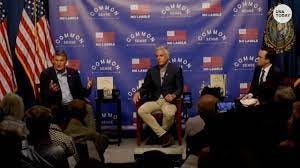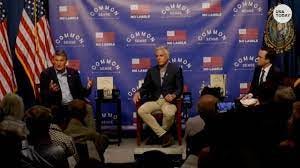During the 2010-2011 academic year we were living just outside Pasadena while Jeralynne spent the year teaching at Azusa Pacific. I was exploring the job market, which is what landed me at Spring Arbor. Ever the political junkie, I was intrigued when a new group called No Labels emerged in 2010.
Always interested in the nature of civil discourse, I signed up for their emails and learned that they were sponsoring periodic meet-ups to bring together interested folks. So I trekked from Arcadia to a friendly bar in Hollywood, to meet up with other No Labels people. As I remember, it was a nice evening with some nice people.
But I never had a clear sense of what they wanted to do or how they were going to get there. So I unsubscribed from the emails and never “met up” again. Frankly, I had forgotten all about my trip to the bar in Hollywood until this summer.
No Labels is back on the national stage. They’ve gotten on the ballot in several states, released a “policy document” (more below), and had a town hall in New Hampshire where Senator Joe Manchin and former Utah governor/ambassador Jon Huntsman answered questions from a No Labels spokesman.
So, some twelve years later, nothing has changed.
In the town hall1, Manchin complained that “both parties had been taken over by the extremes”. He and Huntsman were sitting in front of a big banner that said “Common Sense”. As Paul Waldman wrote in the Washington Post:
The trouble today is that when you hear someone make an appeal to common sense, as countless politicians in both parties do, there is a good chance they’re leading you down a path in which reality is denied and solutions have little or nothing behind them.
The problem for No Labels is that they lack guiding principles. What they have is a “pox on both your houses” critique of contemporary partisan politics with a naive call for bipartisanship and compromise.2 Matt Bai, author of the excellent All The Truth is Out about the Gary Hart campaign, wrote the following in his Washington Post Op-Ed yesterday:
In my view, the problem with No Labels is not that it’s trying to find a reform agenda that defies the orthodoxies of either party. The problem is in assuming that such an agenda can be found at the midpoint between the two parties, rather than making the case for whichever policies are right — regardless of whether they sound extreme or which party originated them.
I reviewed the No Labels “policy document” that was released last weekend. Its introduction says:
The way out is for America’s growing commonsense majority to come together in advance of the 2024 presidential election, to demand something better, and to clarify what we expect from whoever will occupy the White House in January 2025.
This is followed by a series of statements that aren’t policies per se, but generalized ideas of potential goals. For example, here’s their position on the budget:
Washington must stop spending so much more than it takes in. From now on, the annual budget should be reasonable and responsible, which means our national debt needs to stop growing faster than our economy.
There is no position taken on what “reasonable and responsible” means. And I guess they’re okay with deficits as long as they maintain a relationship to GDP.
Here’s what they say in one of their planks on public safety:
Public safety is the highest priority. We need to fix the criminal justice system so career criminals can’t keep committing crimes.
As someone who taught criminal justice for years, I have literally no idea what this means. Are we locking up “career criminals” for life? Are we reforming the criminal justice system so that people don’t become career criminals? Your guess is as good as mine.
Matt Bai captured the problem for No Labels very well. He observes that they seem to be taking recent polling data on political issues and finding the pathways that fall halfway between the partisan options.
After all, King Solomon didn’t come to embody wisdom by actually splitting a baby down the middle — that would have been sadistic even for the Old Testament. The baby-splitting was just a threat. The wisdom came in taking the time to discern who had the righteous cause.
The vagueness of these policy positions, if you can call them that, is no surprise. When I was looking for the recently released “Common Sense” document, I went to the No Labels webpage. What I found there was something called “The No Labels Policy Playbook”. It is very similar to the new document. I don’t know when it was created (it’s undated) but it does say we should “Make American energy secure by 2024” so I’m pretty sure it’s a few years old. The two documents feel very similar, which raises the question of how well they are tuned to our current moment.
Oh, and I couldn’t find anything dealing with issues of race or economic inequality or LGBTQ or religion in their top-line policy statements. Seems like a glaring omission for a group developing common sense solutions.
In addition to the vague policy solutions that pick some from column A and some from column B, No Labels is plagued by a couple of other major problems. First, they misunderstand what it means to be an Independent in modern politics.
They correctly noted in their news releases this spring and summer that an increasing number of people are registering as Independents. In fact, Independents are becoming the plurality when it comes to partisan identification.
But most legitimate polling organizations are providing more nuance to this question. In addition to comparing Republicans, Democrats, and Independents, they follow up with a question about partisan lean. When you combine the leaners with the official partisan label, the percentage of True Independents drops to around 10%. No Labels assumes those leaners will come together by moving away from the partisan choice. That’s remarkably naive.
A second major issue is that No Labels is only focused on the presidential race. That’s why organizers say that they aren’t really forming a political party. But this is a mistake. To really build a common sense third party, they should start from the bottom up. Begin with state legislatures and congressional races. After all, what makes anyone think that the imagined No Labels President could pursue any of the goals without a non-partisan segment of the Congress? Is the Freedom Caucus going to suddenly change their tactics and become committed to Good Governance? Fat Chance.
I’m not even addressing the concerns that many have raised about the number of conservative donors supporting No Labels. While it may not necessarily be the Trojan Horse that pundits worry about leading to Trump’s election, it’s hard to imagine those donors supporting the Split the Baby approach to policy proposed.
At the moment, people aren’t buying what No Labels is selling. A Monmouth poll released yesterday shows that 65% of respondents would either probably not or definitely not support the effort.
That figure rises to 75% when asking about a Manchin/Houseman ticket instead of a generic candidate. Don’t even think about Joe Lieberman or Kyrsten Sinema! And you have to think that the novelty of No Labels sets this as the high water mark of their support.
Of course, our partisan politics need some better solutions to governing. There are issues that could be addressed according to polling data. But the solutions to those problems are not some nebulous middle-of-the-road organization. It rests instead in solving issues like voting access, lessened gerrymandering, ranked-choice voting, and reducing performative grandstanding. No Labels will not get us those solutions.
Actually, in the opening minutes which is all I could watch.
It’s particularly frustrating to see Manchin’s history of blocking compromise in his role in the Senate.






Thank you John, this was insightful and interesting. It would be a blessing if we had a coherent, thoughtful, viable third party that could really give the Rs and Ds a competitive race. Right now I don't see that happening in my lifetime. It seems to me that it's dangerous to vote for any third party presidential candidate, as it really ends up just throwing one's vote away and likely leads to the winner being the candidate one least wants in office. I am so frightened by one candidate that I wish third parties would bow out of this next election. ...Thanks again and God bless.